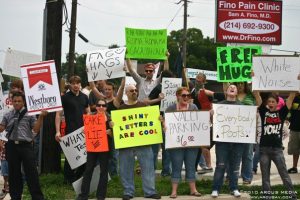The Fred Phelps clan was at the Supreme Court on Wednesday in a case involving their alleged right to picket military funerals. A jury awarded the family of a fallen soldier $10 million, but that verdict was overturned by an appeals court.
During Wednesday’s one-hour hearing of oral arguments in the case, Phelps cult members stood outside the Supreme Court picketing with their “God hates …” signs.
The attorney for the family of the soldier argued that if context ever mattered in a free speech case, this was it, according to the Washington Post. Attorneys general from 48 states signed on to briefs supporting the family, and 40 senators have also sent their support.
Margie Phelps, one of Fred Phelps’ daughters, argued on behalf of the family. She said the protest was done with “great circumspection” and within boundaries of previous Supreme Court rulings.
Justice Samuel Alito seemed the most sympathetic to the soldier’s family, while Ruth Bader Ginsburg seemed to have the most trouble with limiting free speech. She suggested no Maryland law was broken and the family could have obtained an injunction.
The attorney for the soldier’s father said his depression from his son’s death and his diabetes were made worse by the protest. Phelps said that being a Catholic and divorced made him a prime target for punishment from God.
Signs also used in the Phelps family’s recent Dallas protests were displayed in court.
The Phelpses have targeted the LGBT community for years, and gays and lesbians don’t take them very seriously anymore. When they were in Dallas, the LGBT community turned it into an all-day party with counterprotests, stupid signs of their own and an opportunity to raise money.
But the Supreme Court case involves a funeral and a family’s grief. The court will need to decide if and when free speech rights end and when a person has a right to privacy. While the Dallas protests were just silly fun, the military funeral protests can be classified as bullying. The intent to hurt other people must be weighed along with the right to speak freely.














